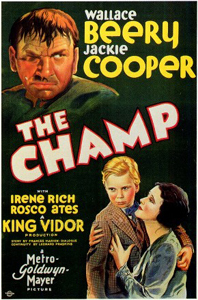
Memorial Day is customarily a day for war movies, more often than not featuring Audie Murphy or (less enjoyably) John Wayne. I opted to break with tradition, however, and watched
The Wrestler.
Here is a movie with a lot to like about it. First and foremost is the great performance by Mickey Rourke. In a picture that is by and large a character study, Mickey Rourke really brings the downtrodden Randy "The Ram" Robinson to life (apparently, he improvised significantly in several scenes, adding to the naturalistic feel of his performance). Secondly, the
mise-en-scene is truly fantastic -- in addition to the gritty camera work, the film's setting in central New Jersey really enhances the feeling of decrepitude that is prevalent throughout the film, particularly the scenes on the ruined boardwalk in
Asbury Park (indeed, much of the filming was done in and around Elizabeth, not far from my old hometown of Passaic). Then there's the surprisingly appropriate soundtrack composed largely of 1980s Glam and Heavy Metal tracks, alongside similarly styled original compositions (performed by former Guns 'n' Roses guitarist Slash). Finally, the film also provides a fascinating behind-the-scenes look at the world of independent wrestling promotions (full disclosure: I was big wrestling fan in the mid '90s. Of course, I still thought it was real back then).

To put the matter simply,
The Wrestler is truly a very good movie. I couldn't help but notice, however, a few striking similarities between this movie and King Vidor's 1931 film
The Champ. To begin with, the protagonists of the two pictures are very much alike -- Mickey Rourke's and Wallace Beery's respective characters are both former champs long past their prime, living in destitution and just managing to eke out a living by fighting in obscure matches. Even their names are similar -- compare Mickey's Randy Robinson to Wally's Andy Purcell. Perhaps the most significant similarity, however, is the fact that both Randy and Andy suffer from dangerous heart conditions.
One significant point of departure, on the other hand, is the protagonists' relationships with their children. In
The Champ, Andy Purcell's relationship with his son Dink (played by Jackie Cooper), although quite strained at times, is nevertheless a loving one. Although he drinks heavily and gambles uncontrollably, Andy still cares a great deal for his son, and Dink looks up to him in spite of his flaws. Although Randy Robinson cares for his daughter Stephanie and regrets not having been a better father to her, it's nevertheless clear that, despite Randy's best intentions, their relationship is largely damaged beyond repair.
Yet the most compelling point of comparison between the two movies might be -- perhaps naturally -- their endings (spoilers ahead, by the way). In a final gamble to turn their lives around, Randy and Andy enter into climactic matches. Although they both emerge victorious, in both cases the victories come (or at least seem to come) at too great a cost. Andy manages to rally from a brutal beating to knock out his opponent, but suffers a fatal heart attack in the wake of the match (as an aside, Jackie Cooper is great in these final few scenes -- his tearful performance doesn't just tug at your heart's strings, it tears the whole thing out of your chest and throws it down at your feet). Meanwhile, Randy is on the way to winning his match when he begins to suffer from heart attack-like symptoms. With his opponent on the mat, Randy pulls himself up to the top turnbuckle for one last leap (this after delivering a heartfelt oration prior to the match, in which he tells the audience that they are his true family). One does not know beyond a doubt that Randy dies after his leap, but it isn't hard to imagine that he does.
Both Andy Purcell and Randy Robinson go out in a last blaze of glory. In doing so, they redeem themselves in the eyes of those dearest to them -- Andy proves his worth to both his son and his estranged wife by sacrificing his life to ensure that Dink has enough money to live on, and Randy manages, even if only for a little while, to once again win the hearts and minds of his own "family."
Of course, this isn't to say that
The Wrestler is a rewrite of
The Champ;
In fact, I'd be surprised if
The Champ actually was the first movie to tell this sort of story. The story of a broken man who, even if only a small way, manages to set things right is a theme with a timeless appeal, and one at the very heart of both movies. Although the films are poles apart in terms of feel and technique, it's their common theme that makes
The Wrestler and
The Champ such excellent movies. Do yourself a favor and watch them both.


